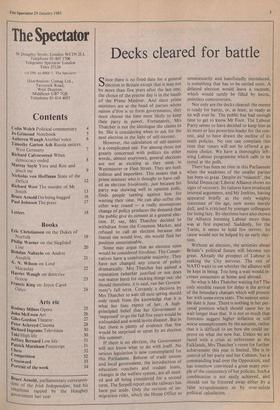Decks cleared for battle
Since there is no fixed date for a general election in Britain except that it may not be more than five years after the last one, the choice of the precise day is in the hands of the Prime Minister. And since prime ministers are at the head of parties whose raison d'etre is to form governments, they must choose the time most likely to keep their party in power. Fortunately, Mrs Thatcher is not the ideologue she claims to be. She is considering when to ask for the next election in the light of self-interest.
However, the calculation of self-interest is a complicated one. For among those not greatly concerned with politics (in other words, almost everyone), general elections are not as exciting as they seem in Westminster or Fleet Street. They are both tedious and important. This means that a prime minister who is thought to have call- ed an election frivolously, just because his party was showing well in opinion polls, finds people turning against him for wasting their time. He can also suffer the other way round — a really momentous change of policy produces the demand that the public give its consent at a general elec- tion. If, say, Mrs Thatcher decided to withdraw from the Common Market, and refused to call an election because she feared she would lose, she would find her position unsustainable.
Some may argue that an election soon would be considered frivolous. The Conser- vatives have a comfortable majority. They have not changed any course of policy dramatically. Mrs Thatcher has gained a reputation (whether justified or not does not matter here) for sticking things out: she should therefore, it is said, run her Govern- ment's full term. Certainly a decision by Mrs Thatcher to wait till next spring should only result from the knowledge that it is what her fans expect of her. A high- principled belief that her Government is `supposed' to go the full five years would be unfounded and would invite disaster. But in fact there is plenty of evidence that few would be surprised or upset by an election this summer. If there is no election, the Government will not know what to do with itself. No serious legislation is now contemplated for this Parliament. Reform of trade unions and local government, the introduction of education vouchers and student loans, changes in the welfare system, are all need- ed and all being considered for a second term. The Serpell report on the railways has been put aside. Only the revision of im- migration rules, which the Home Office so unnecessarily and ham fistedly introduced, is something that has to be settled soon. A delayed election would leave a vacuum, which would surely be filled by hectic, pointless controversies.
Not only are the decks cleared: the enemy is ready for battle, or, at least, as ready as he will ever be. The public has had enough time to get to know Mr Foot. The Labour Party seems to have decided to keep him as
its more or less powerless leader for the con- test, and to have drawn the outline of its main policies. No one can complain this time that voters will not be offered a ge- nuine choice. We have a thoroughly left- wing Labour programme which calls to be tested at the polls.
There has been no time in this Parliament when the weakness of the smaller parties has been so great. Despite its 'relaunch', the Social Democrat/Liberal Alliance shows no signs of recovery. Its failures have produced internal arguments, and Mr Jenkins, having appeared briefly as the only weighty statesman of the age, now seems merely dull, and is criticised by younger colleagues for being lazy. By-elections have also shown the Alliance harming Labour more than was at first expected. Suddenly, for the Tories, it seems to hold few terrors. Its cause would not be helped by an early elec- tion.
Without an election, the anxieties about Britain's political future will become too great. Already the prospect of Labour is making the City nervous. The rest of NATO waits to see whether the alliance will be kept in being. Too long a wait would in- crease uneasiness at home and abroad.
So what is Mrs Thatcher waiting for? The only sensible reason for delay is the arrival of the boundary changes which will present her with someextra seats. The nearest sensi- ble date is June. There is nothing in her per- sonal position which should cause her to wait longer than that. It is not so much that forecasts suggest higher inflation or still worse unemployment by the autumn, rather that it is difficult to see how she could im- prove on what she now has. Unless we are faced with a crisis as unforeseen as the Falklands, Mrs Thatcher's room for further achievement this year is limited. She is in control of her party and her Cabinet, has a commanding lead over the Opposition, and has somehow convinced a great many peo- ple of the consistency of her policies. Such a combination is not easily achieved, and should not be frittered away either by a false scrupulousness .or by over-subtle political calculation.






































 Previous page
Previous page